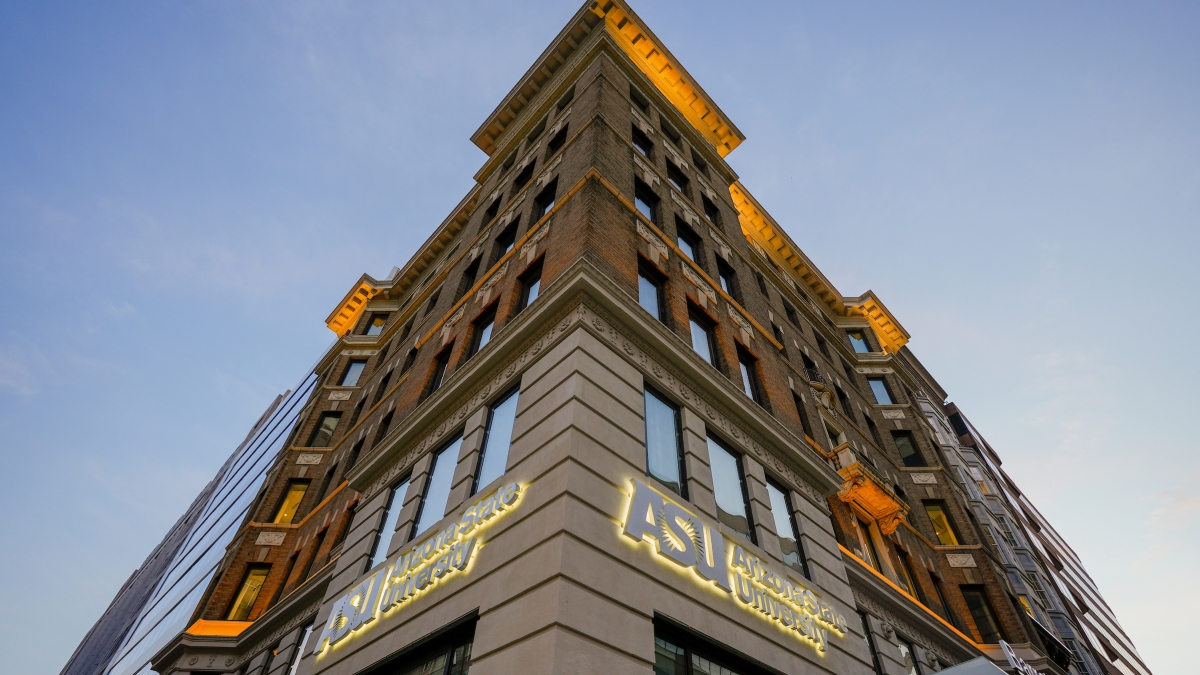ASU hosts first event at newly established US-ASEAN Center

The ASU Barrett & O’Connor Washington Center in our nation's capital. Photo by Samantha Chow/Arizona State University
In mid-February, the U.S.-ASEAN Center hosted a strategic planning session with U.S. State Department officials, Arizona State University staff and ASEAN (Association of Southeast Asian Nations) country representatives.
The event offered attendees the opportunity to discuss current priority areas of the center, suggest new programmatic ideas and ask questions to ASU and State Department staff about the plans of the center going forward.
The strategic planning session was the first event hosted by the U.S.-ASEAN center, which was inaugurated in December of last year. The center is located at the ASU Barrett & O'Connor Washington Center in downtown Washington, D.C.
“There are a couple of initiatives we want to start here — the first being the strategic plan. The input we get from these group discussions are going to inform our plans for the center,” said Dominic So, deputy director of the Office of Multilateral Affairs at the State Department. “The second is improving operational capacity. The center is open for business, but it’s going to take some time to ramp up to the full operational capacity that we envision.
"And then lastly, event curation. We're selectively curating events — we want the initial events here to have the biggest impact that we can.”
The center, first announced by Vice President Kamala Harris at the U.S.-ASEAN Summit in Jakarta, Indonesia, in September 2023, was established and codified into law when President Joe Biden signed the 2024 National Defense Authorization Act in December 2023. The act authorized the U.S. State Department to enter a public-private partnership with ASU and memorialized congressional support for the center.
So led the discussion and gave remarks on the structure of the center and its goals.
“The U.S.-ASEAN Center is a public-private partnership between the United States Department of State and Arizona State University,” So said. “The goal of the center is to deepen the relationship between the U.S. and ASEAN, while bolstering support for U.S. economic and cultural engagement in Southeast Asia and connecting private-sector organizations, academic institutions, civil society, groups and culture.
"What we envision is the center hosting programs and events that will strengthen the various facets of our U.S.-ASEAN relationship.”
While the center is headquartered at the ASU Barrett & O'Connor Washington Center, the strategy sessions focused first on programs that meet the center objectives. The center will leverage ASU venues in Arizona, California, Washington — and ASU locations across ASEAN — to align to defined activity objectives. One key outcome is to increase the visibility of the U.S. and ASEAN partnership through these collaborative programs and activities.
The discussion focused on providing new suggestions and ideas that will help advance five key areas of focus identified by the center, the first of which is official engagement.
The center will host various high-level dialogues and presentations in the coming months that will feature key individuals and cover important areas of cooperation between the U.S. and ASEAN. For example, the center plans to have the ASEAN Secretary General Kao Kim Hourn host an event on this topic in the near future.
Economic and innovation cooperation, as well as cultural and educational activities, were two other areas of engagement suggested by attendees. Many expressed hope that the center will look to explore new avenues to expand the economic and technical relationships between ASEAN countries and the U.S.
Topics requested or consideration included emerging technologies, artificial intelligence, cybersecurity and other skills-building opportunities like academic exchanges and capacity-building programs. Several attendees also asked for the center to identify and champion activities that support cultural education connectivity between the U.S. and ASEAN, similar to what the People-to-People Student Ambassador Program has done in the past.
Expanding research opportunities at the center was another commonly discussed engagement area, as several participants noted that the center is an inclusive and accessible space where scholars from both the U.S. and ASEAN can undertake important academic and private-sector research in areas of mutual interest; in particular, how to connect ASU faculty and research centers to counterparts in ASEAN to increase bilateral research engagements and student mobility between the U.S. and ASEAN through key center programs and activities defined by university, government and industry partners.
Last week’s strategic planning discussion was the first of many events the center plans to host in the coming months. With the center having just opened, event curation, solidifying the center’s strategic plan and improving operational capacity are the immediate focus for center leadership.
More Local, national and global affairs

Video series tells story of 'Resettled People'
What better way for the story of former refugees to be told than having the refugees tell those stories themselves.That’s the idea behind "STEM Dreams in Motion: Stories of Resettled People."Using…

Department of State and ASU host Government Leaders Forum to strengthen semiconductor supply chains
By Emilia FrancoAs the global demand for semiconductors accelerates — with projections reaching $1 trillion by 2030 — Arizona State University, in partnership with the U.S. Department of State,…

Environmental writer, ER doctor address violence, climate change, more at sold-out ASU event
“The difficulty of understanding the consequences of heat is amplified by conventional notions of what it means to be hot. In pop culture, hot is sexy, hot is cool, hot is new…” That excerpt was…